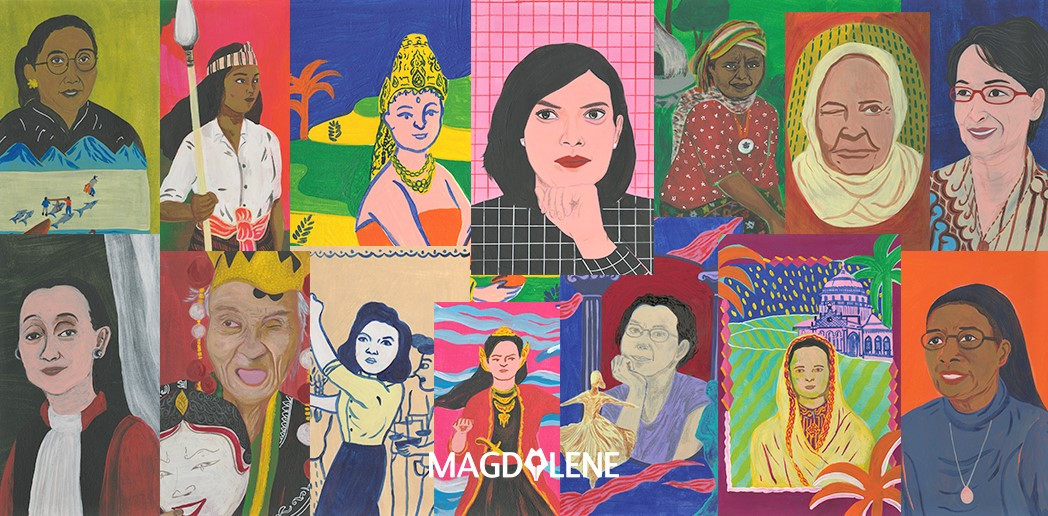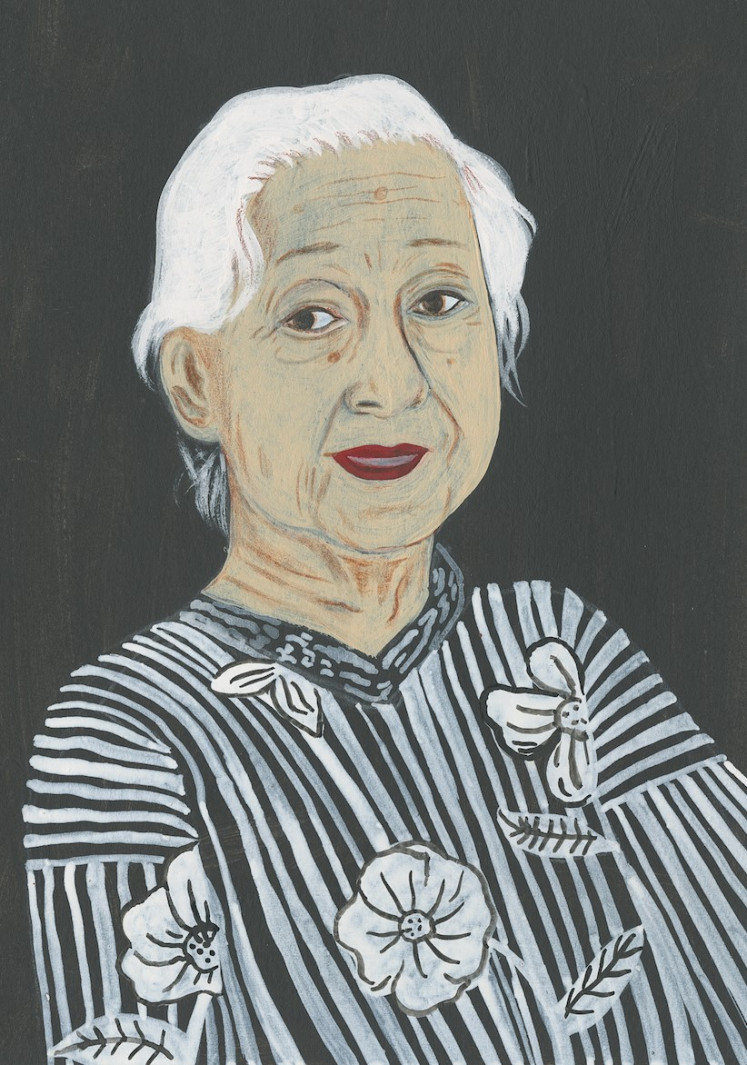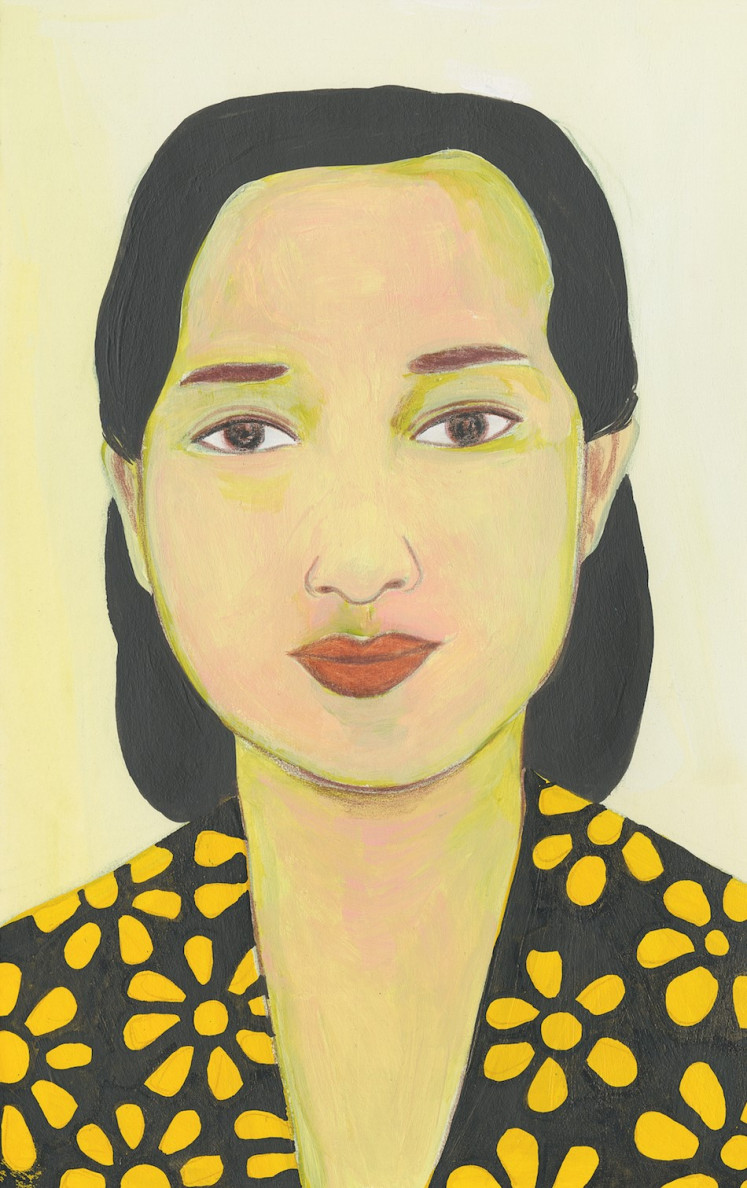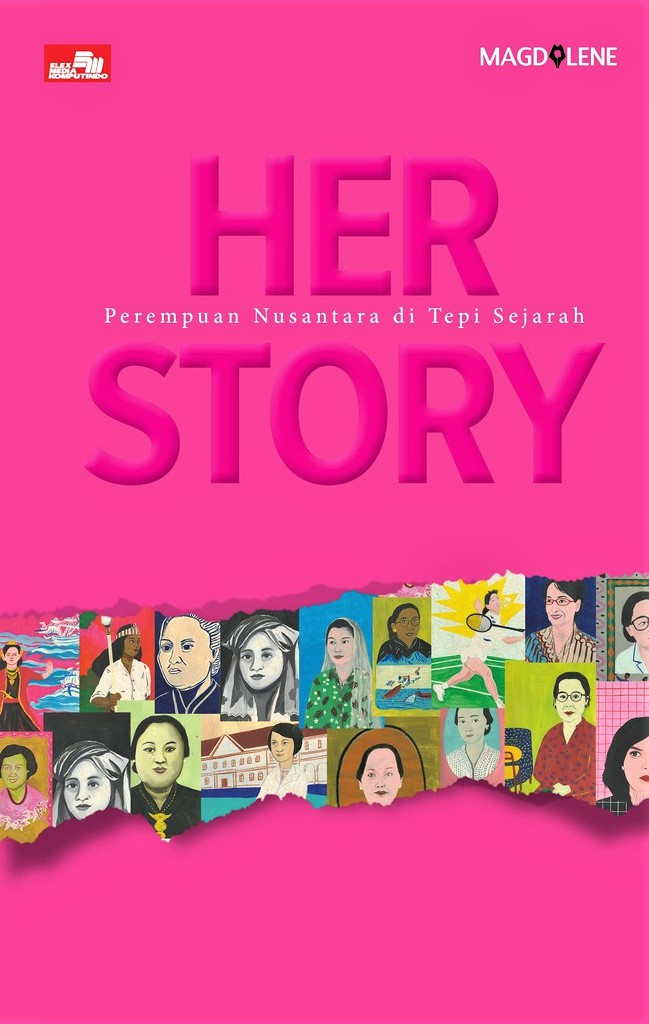Popular Reads
Top Results
Can't find what you're looking for?
View all search resultsPopular Reads
Top Results
Can't find what you're looking for?
View all search results‘Herstory’: Celebrating remarkable Indonesian women & their legacies
An illustrated book published by online feminist publication 'Magdalene' seeks to shed light on Indonesian women who have left remarkable legacies in the public realm.
Change text size
Gift Premium Articles
to Anyone
 Women, front and center: A mosaic of illustrations by artist Karina Tungari features Pop Art-esque portraits of the 100 prominent Indonesian women whose stories appear in 'Herstory: Perempuan Nusantara di Tepi Sejarah' (Herstory: Indonesian Women on the Margins of History), a book by online feminist publication 'Magdalene' launched on Dec. 1, 2020. (Courtesy of magdalene.co/-)
Women, front and center: A mosaic of illustrations by artist Karina Tungari features Pop Art-esque portraits of the 100 prominent Indonesian women whose stories appear in 'Herstory: Perempuan Nusantara di Tepi Sejarah' (Herstory: Indonesian Women on the Margins of History), a book by online feminist publication 'Magdalene' launched on Dec. 1, 2020. (Courtesy of magdalene.co/-)
W
hen you ask ordinary Indonesians to name the country’s national heroes, chances are that they won’t be able to name more than a handful or two, with the majority of names, if not all, being the names of male national heroes. It only goes to show just how male-centric our history curriculum and narratives are.
Most might mention our national heroines Raden Adjeng Kartini or Cut Nyak Dhien, just two women who have contributed significantly to Indonesian life and society in our history.
In a bid to rectify the situation, online feminist publication Magdalene (magdalene.co) launched Herstory: Perempuan Nusantara di Tepi Sejarah (Herstory: Indonesian Women on the Margins of History), an illustrated book published by Elex Media Komputindo of the Kompas-Gramedia Group.
Herstory provides an introduction to 100 influential Indonesian women through short biographies, from the ancient kingdoms and onward to the present.
The women covered in the book are not restricted to only historical figures and those who have been engaged in politics and activism, and also honors women who have pursued endeavors in a variety of fields, from academia to science, from sports to culture, and from social work to the business world.
Apart from exploring the stories of more familiar women like Queen Shima and Raden Dewi Sartika, Herstory also presents some lesser-known yet equally extraordinary women.
Evie Pottieray (Courtesy of Magdalene/Karina Tungari)One of these is Evi Pottieray, who went to study in the Netherlands in the late 1930s and ended up joining the anti-Nazi resistance movement, and ultimately became an activist of the Indonesian revolution, fighting for Indonesia’s independence from the Dutch colonial government.
Another is Umi Sardjono, who chaired the Indonesian Women’s Movement (Gerwani), an organization heavily stigmatized by the New Order regime.
Then there is writer Siti Rukiah Kertapati, whose literary works equal that of PEN Freedom award winner and multiple Nobel nominee Pramoedya Ananta Toer, but her affiliation with the now-defunct Indonesian Communist Party (PKI) meant that all her books were banned by the New Order.
Ultimus, an indie publishing house in Bandung, West Java, has recently started publishing Siti’s titles, including her 1950 novel Kejatuhan dan Hati (Ruin and the Heart) and Tandus (Barren), a short story and poetry anthology.
Siti Rukiah Kertapati (Courtesy of Magdalene/Karina Tungari)From the contemporary era, Herstory presents women in government, including Finance Minister Sri Mulyani Indrawati and former maritime affairs and fisheries minister Susi Pudjiastuti, as well as Muslim scholar Musdah Mulia and environmental activists Sukinah Kartini Kendeng and Aleta Baun.
The biography of each woman comes with a colorful Pop Art-esque portrait drawn by Karina Tungari. Magdalene columnist and history scholar Nadya Karima Melati researched the women in Herstory, while editor-in-chief Devi Asmarani and managing editor Hera Diani edited the book.
Devi said that Herstory was designed to be a popular publication instead of academic literature, inspired by the illustrated book series Good Night Stories for Rebel Girls by Francesca Cavallo and Elena Favilli.
“So it was impossible for us to accommodate all women public figures in Indonesia,” Devi told The Jakarta Post by phone on Dec. 8.
“We have curated the 100 [leading figures] based on their public careers, their consistency in pursuing their chosen career, the impacts they made in their respective fields, as well as whether they left behind a significant legacy in our contemporary history,” she said.
Devi added that the Magdalene team selected women whose actions and activities also reflected feminist values.
“Hopefully, this book can open people’s eyes to the fact that Indonesia has so many female figures who served the nation throughout [its] history,” Hera said at the virtual book launch on Dec. 1.
The other side of history: The illustrated paperback presents a counter-narrative to the male-centric history taught at school. (Courtesy of magdalene.co/-)Historian, editor and writer Raisa Kamila has praised Herstory for bringing the stories of exemplary Indonesian women to the forefront of public consciousness.
“If we didn’t have this kind of reference book, people will continue to relegate women as second-class citizens, since they still have the mistaken perception that women have held no public roles or [made any] contributions to the public,” Raisa told the Post by phone on Dec. 7.
Continuing, she said that this kind of misperception could also be used to justify the confinement of women to only domestic roles, and in turn lead people to believe that women who work in the public sphere were a threat.
“For instance, people [tend to] say, ‘As a woman, you should just stay at home. If you work or take active part in an organization, it will destroy your marriage,’” Raisa said, referring to one of the stereotypes of working women that exist in Indonesia.
She also pointed to several ways in which Indonesian women had been marginalized in the academic field of history.
For example, almost all notable historians in pre-independence and newly independent Indonesia were men, such as Sartono Kartodirdjo, Taufik Abdullah, Anhar Gonggong and Asvi Warman Adam. And the Indonesian archivists who worked for the Dutch government were also men.
“Therefore, they only archived and included issues they considered interesting from a male perspective, such as popular revolutions and military actions […],” she said.
“So, when women were not recorded in their archives, it was not because the women didn’t [contribute] anything. It was because the [male archivists] didn’t see the women’s efforts as interesting.”
And when women were mentioned, they were significant only because she was someone’s wife. “For instance, when a woman was a victim of a traffic accident, the archivist referred to her as ‘the wife of’ mister so-and-so,” said Raisa.
But these days, thanks to the many scholarships available, she said that more Indonesian women were able to pursue postgraduate history degrees abroad. These scholars had specialized in various subjects, ranging from genocide and slavery to public health.
Rattling off some names, Raisa mentioned Grace Leksana, Tika Ramadhini and Ligia Giay.
Grace has just earned her PhD from Leiden University in the Netherlands, specializing in individual memories about the 1965 communist purge. Tika is pursuing a doctorate in Germany with a focus on the exchange of knowledge between Muslim women in Southeast Asia and Mecca in the 19th and 20th centuries, while Ligia is in a doctorate program at an Australian university, studying the history of slavery in Indonesia.
“Today, we’ve established an association of female historians [which Grace, Tika and Ligia yet to join). Please wait for our works,” Raisa said. (ste)













